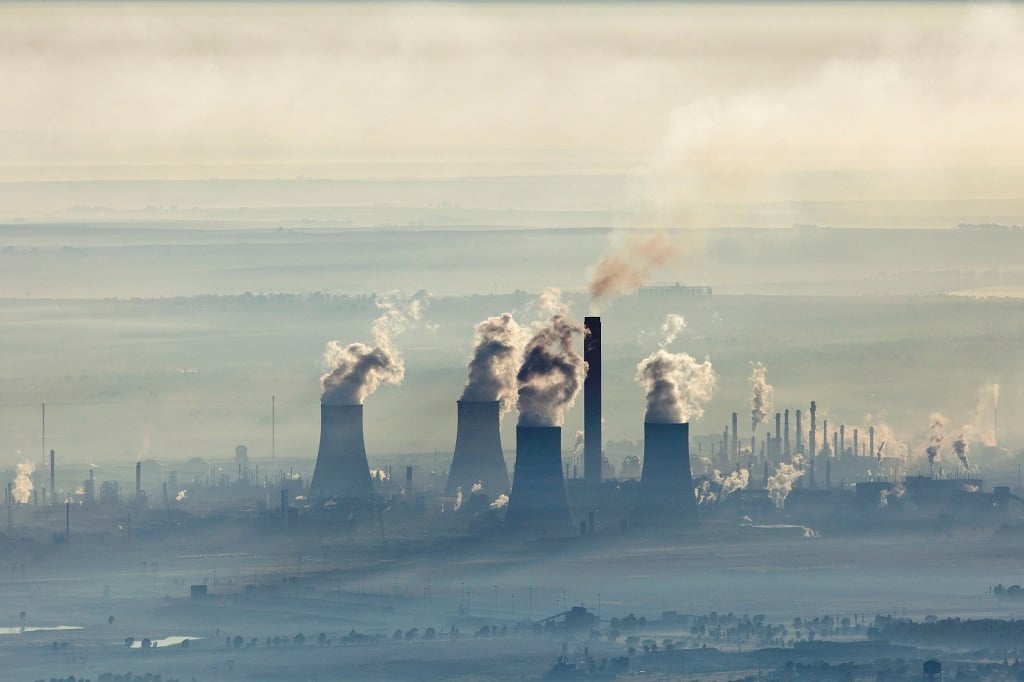
There are two key points that Fossil Free South Africa would like the public to know about the fossil fuel industry that is the main driver of the climate crisis and a key driver of a host of other problems that we have come to take all too much for granted, writes David le Page.
- For climate change news and analysis, go to News24 Climate Future.
Africa Oil Week took place in Cape Town over a week ago, and Capetonians should be outraged: a highly climate-vulnerable city hosting an oil conference is an absurd spectacle. Our leaders should be ashamed for hosting this conference of exploiters (the convention centre is 95% owned by the city and Western Cape province).
But outrage is limited because the public remains confused: Why are fossil fuels (coal, gas and oil) now really bad? How bad are they? Were they always this bad?
As an anti-fossil fuel climate and human rights campaign, there are two key points that Fossil Free South Africa would like the public to know about the fossil fuel industry that is the main driver of the climate crisis and a key driver of a host of other problems (air pollution, inflation, profiteering, war, corruption, plastic pollution) that we have come to take all too much for granted.
These two key points are, firstly, why fossil fuels are indeed now very bad, and, secondly, why doubling down on fossil fuel use, as our Minister of Minerals and Energy Gwede Mantashe seeks to do, is guaranteed to reinforce the worst long-term failures of South Africa's economy.
So, firstly, why are fossil fuels now bad when, for so long, their use was an unprecedented driver of human progress?
Some Africans are understandably resentful that developed countries advocating in some developing countries to use renewable energy are apparently "pulling up the ladder" of fossil fuel use behind them.
It's unquestionably true that much of modern prosperity and human well-being is based on the (once-off) energy dividend that humanity has in the earth's fossil fuel reserves. But our use of fossil fuels has grown to a point where they are now breaking the living earth systems we all depend on and doing great damage to people and economies.
READ | We need to hit the brakes now on fossil fuel superhighway, or else: climate scientist
This is because fossil fuel use comes with very significant hidden costs. These costs are called externalities by economists (who then mostly ignore them). When you buy petrol from Sasol, for example, you are not charged the full, real cost of that petrol.
Yes, Sasol charges you for the cost of manufacturing your tankful of petrol, and you also pay their profit margins. But neither you nor Sasol pays for the healthcare costs of people affected by air pollution from Sasol's plants and from your car engine.
You're not paying for the social costs experienced by communities in Mozambicans, whereas Anabela Lemos, from Justiça Ambiental (JA!), describes, "Since Sasol opened the floodgates to gas exploitation in Mozambique two decades ago, the communities around its Pande and Temane projects have been pushed deeper into poverty, the economy remains in tatters and only 30% have access to electricity."
You don't pay the costs of Mozambican government corruption linked to the gas industry.
Most significantly of all, you are not paying for the R224 billion worth of global climate damage done by Sasol's 2023 carbon emissions of 64 million tonnes. This is based on the assumption that the social cost of carbon is assumed to be $185 per tonne.
Like SA's other big emitters, Sasol neglects to report that damage in its climate change report.
In response to questions, Sasol said it is aware of research into calculating the social costs of carbon emissions but noted it is a complex system with "significant degrees of variability in methodologies, data and data sources."
"Greenhouse gas emissions are a global phenomenon and cannot be simply localised to a single emitter where a simplistic 'cost calculation' can be attributed, and the benefits not factored in. Sasol has not undertaken its own analysis as yet – when we do, we would then put forward our estimation and approach," a spokesperson said.
When we raised the social cost of carbon (climate damage of at least R72 billion) from Thungela's mammoth emissions earlier this year via shareholder engagement, Thungela's officials offered no challenge to these figures. A Thungela spokesperson said that governments and policymakers generally use the social cost of carbon to guide policy decisions. "It is not something that is commonly applied to companies."
External costs
These external costs of using fossil fuels – and I've not listed all of them – are real costs to real people. Not to you, directly, or Sasol. But they do bite you in the end – whether it's your child's asthma, an outrageous petrol price increase, a government that's far more responsive to Shell's interests than to your own – or the climate crisis that's bringing ever nastier natural phenomena on us every year.
When human beings started using fossil fuels, externalised environmental costs were relatively manageable because they were generated on a minor scale compared to the global ecosystem. But from the 1970s onward, these costs began to exceed critical geophysical boundaries.
The capacity of earth's ecosystems for absorbing these additional pollutants without being fundamentally damaged was exceeded. This is like being aboard a very large spacecraft and slowly – and deliberately breaking it in ways that cannot be fixed.
There is no longer, anywhere in the world, any authentic profit to be made from fossil fuels because now that the concentration of carbon dioxide in the atmosphere has exceeded safe limits, each and every instance of fossil fuel comes with greater real costs than economic benefits.
Fossil fuel companies now run a gigantic wealth syphon – anyone who profits from their activities now inevitably does so at great and increasing cost to everyone else, but especially climate-vulnerable communities and future generations.
READ | Who is Alex Epstein - and where did these protesters welcoming him to SA come from?
Yes, Shell, Sasol and Total can still create the illusion of profit for their employees, shareholders and corporate social responsibility beneficiaries – but going back to Sasol as an example, their 2023 social investment spend of R857.3 million is dwarfed by that mammoth R224 billion climate damage bill that they'd really rather not even mention.
In a world where we have now nearly doubled the global warming potential of the atmosphere, the iron laws of geophysics impose an identical impossibility of profit on every coal, oil and gas operation, old or new, in the world. Every exploration plan cheered in Cape Town last week is a de facto promise that more people will be abused and exploited than will benefit.
Doubling down on fossil fuels
Let's move on to the second point: why doubling down on fossil fuel use, as our mineral resources and energy minister seeks to do, is guaranteed to reinforce all the worst long-term failures of South Africa's economy if that's not already clear enough.
There are three broad ways in which people can generate economic value: extraction – finding and selling existing natural resources; construction – creating new combinations of existing resources. Or co-creation – building things and systems in ways that not only create value for humans, but also support and enhance natural systems and biodiversity.
There's abundant evidence that economies based on construction and co-creation are more prosperous, democratic and egalitarian than those based on extraction.
But the fossil fuel industry exemplifies the extraction model that has both allowed and limited South Africa's own economic development, bequeathing us the world's highest inequality – an injustice that now seems to engage our politicians only when they're promising to fix it, absurdly, by doubling down on its causes.
South Africa's economic history, through slavery, colonialism, the apartheid labour reserve system, and large-scale mining, has been dominated by extraction – both from the earth and from people.
Our reflex preference for making money has always been to rip stuff from the earth and brutally exploit human beings in the process.
Our post-apartheid leaders in government and business, unduly influenced by the especially nasty flavour of capitalism, have been either too greedy or too unimaginative to move decisively past this model of human and resource exploitation.
Expanding the fossil fuel industry is not a responsible move in service of our energy security and human development, as Sasol CEO Fleetwood Grobler has implied while releasing his company's latest set of utterly dismal decarbonisation metrics reflected in the 2023 Climate report. Sasol aims for a 30% reduction in emissions by 2030.
If it were, other African countries with even greater fossil fuel resources than our own would have become thriving social democracies like the one promised in our Constitution but still far from being realised.
No, expanding the fossil fuel industry is repeating the same fundamental economic mistakes that we have made again and again – of over-investment in extractive wealth creation.
Look at Nigeria, Algeria, Libya, and Angola – all the African states "blessed" with fossil fuel resources even greater than our own… those are the futures towards which Minister Mantashe and our Department of Mineral Resources and Energy, and their many enablers in the media and industry and other parties, are trying to steer us, whether they realise it or not.
What's the alternative? All too few people realise that we're all living through an extraordinary time in human history: a time when we cannot only get energy from renewable sources at far lower cost than the fossil alternative – the International Energy Agency describes solar as "the cheapest electricity in history" – but are also learning how to create land management and agricultural systems that work with nature rather than destroying it, and learning how to properly value and nurture human and other living beings.
These advances add up to an opportunity for us to throw off the inequities and injustices of the past and create a new, more deeply rooted prosperity.
But South Africans – and the global South – are instead being misled by these so-called leaders of government and industry that paraded at the Cape Town International Convention Centre.
Don't believe the lies and spin: claiming the right to emulate the obsolete fossil-intensive development pathway used by the global North just condemns us to ever more corruption, inequality and disappointment.
David Le Page is the coordinator of Fossil Free SA, the campaign for fossil fuel divestment and sustainable reinvestment.
News24 encourages freedom of speech and the expression of diverse views. The views of columnists published on News24 are therefore their own and do not necessarily represent the views of News24.




 Publications
Publications
 Partners
Partners












